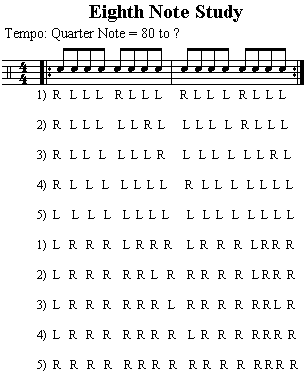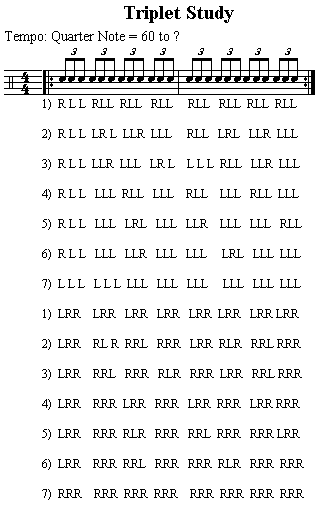Workin' the Weak Hand
Right-handed drummers often have trouble with their left hand, while left-handed drummers have trouble with their right. Your "weak" hand can keep you from reaching your full technical potential.
This week, I show you how the pros develop their weak hands on and off the drum set. Once you can play with equal power and ability from either hand, monster chops are just a step away.
Use It
The best way to develop your weak hand for drumming is to use it for everything! Open doors, carry books,
drink from a glass (in the beginning, you'd better make that a paper cup), eat, and so on. Whatever you
normally do with your "natural" hand, you should do with your weak one. This helps build muscle
memory in your weaker hand, which helps in playing the drums.
For the next step, you'll need a metronome and a practice pad. A metronome accurately clicks on each beat of the particular tempo that you set. If you've never used a metronome before, now is the time to start. Practicing with a metronome not only helps develop your sense of tempo, but is the best way to judge your progress as you build up strength and speed in your "weak" hand.
Workin' the Eighths
The first exercise (see the Eighth Note Study below) develops your weak hand through the use of various
sticking patterns. You'll notice that the first five exercises work the left hand and the second five work the
right hand. This is so you can build up your weak hand, while keeping your strong one in good shape.
When you first practice each exercise, use the slowest suggested metronome setting. Then, when you feel comfortable, gradually increase the tempo.
Try to keep your fingers, hands, and arms relaxed when you play. Tensing the muscles slows you down, and you'll never be able to reach the fastest suggested metronome settings.
Here are five major points to watch while practicing the Eighth Note Study below:
- Stay loose and relaxed at all times
- Set your metronome to a tempo that you can comfortably play
- Don't increase the tempo until you can play the exercise with ease
- Play each exercise evenly
- Make sure you are playing at the exact same volume with each stick

The next series of exercises concentrates on Triplets (see the Triplet Study below). Apply the above five major points to these exercises as well.
You'll notice that the first series of seven exercises work the left hand, while the remaining seven work the right. Again, this allows you to keep your strong hand in shape, while building up your weak one.

Workin' the Sixteenths
The final series of exercises concentrates on sixteenth notes (see the Sixteenth Note Study below). Apply the
following five steps to these exercises when practicing:
- Stay loose and relaxed at all times
- Set your metronome to a tempo that you can comfortably play
- Don't increase the tempo until you can play the exercise with ease
- Play each exercise evenly
- Make sure you are playing at the exact same volume with each stick

No Weak Hand
I'm naturally right-handed, yet I'm as comfortable drumming with my left hand as with my right. By practicing
the previous exercises properly, and favoring your "weak" hand when performing your non-drumming
tasks as explained above, you should soon be able to develop the same ability. It's easy. All it takes is some
regular practice.
Until next time: Stay loose.
